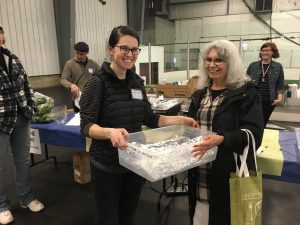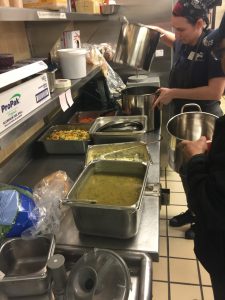By Mark Peterson
For those of us in the nonprofit world, grant reporting is often a dreaded task, one that takes time away from the ‘real world’ things we are working to accomplish. We understand funders want to know their grant or contract dollars are being used in the intended way, and making the intended impact–which is totally reasonable. But, in my experience and certainly among my coworkers here are Sustainable Connections, we are doers: getting stuff done, making a positive impact, completing deliverables, and moving on to the next good thing. Looking backward isn’t generally our nature.

Addie Candib of Whatcom Dispute Resolution Center donating excess food from a fundraising event to Food Recovery Initiative Volunteer Edith Misanes of Jesus Christ Cornerstone Christian Ministries.
Lately though, my perspective has shifted, and I have actually started to look forward to the time I need to carve out to gather data, check in with partners, and assess progress being made. I have often written in this space about how it is important to measure what matters–because what gets measured gets managed. Sometimes though, the measuring is easier said than done.
At this juncture I am somewhat stumped on how to measure the subjective–the good feelings that fill my heart. We started our Food Recovery Initiative to help restaurants and food producers and other commercial enterprises with excess edible food get this precious resource to those in need. I am an old dog in the world of waste reduction, but just a pup in the world of hunger relief, and at times I am overwhelmed with gratitude for the support of the pack.
The genuine caring, passion, and humility with which the hunger relief community approaches their work is incredibly inspiring and reinforces my opinion that even more great things are still to come as we continue to work together. Who has inspired me the most isn’t the Executive Directors, the Food Service Managers, or people like me managing programs; no, it’s the kind souls behind the scenes quietly going about their business with care, commitment, and intention.

Mt Baker Care Center employee preparing food donations.
Recently, we met with one of our earliest participants in the Food Recovery Initiative, Mt. Baker Care Center. They shared how much importance their culinary staff has placed on participation in this program. Each employee has a heartfelt interest in being diligent about treating their food with care, being sure to maximize what they can send to those less fortunate than themselves.
This grant reporting period gave me a moment to pause and reflect and remember that the 1,700 meals and 5,700 lbs. of surplus food (that would previously have gone to compost or trash) redistributed in our community in the past year didn’t happen from one person or one entity. Instead, it has been a community effort often carried out by those who may never meet those who will benefit from their extra efforts. It is times like these when grant reporting feels good–like really good.
So, I’d like to extend a huge thank you to everyone involved in our Food Recovery Initiative, because today my heart is full, filled with optimism and gratitude.
If you’re a business that would like to get involved with this inspiring program, learn more here. If you’re an individual, you can do your part too. Take the pledge and learn how you can Squatch Food Waste too!
